Movie Review – Boat That Rocked, The
Rambling, stylish, flippant throwback to an era long since gone, the age when rock ‘n’ roll was more about the music, and the radio DJ’s who played it, than the rock-stars themselves. Based loosely on historical fact, The Boat That Rocked is a great ensemble piece that sets out merely to entertain, and almost nothing else. Featuring some great stunt casting, and a genuine love of the era by director Richard Curtis (Notting Hill, Four Weddings & A Funeral), The Boat That Rocked is a genuinely entertaining film with little to say about life generally, unless your outlook is to party all of the time, all day, and all of the night.
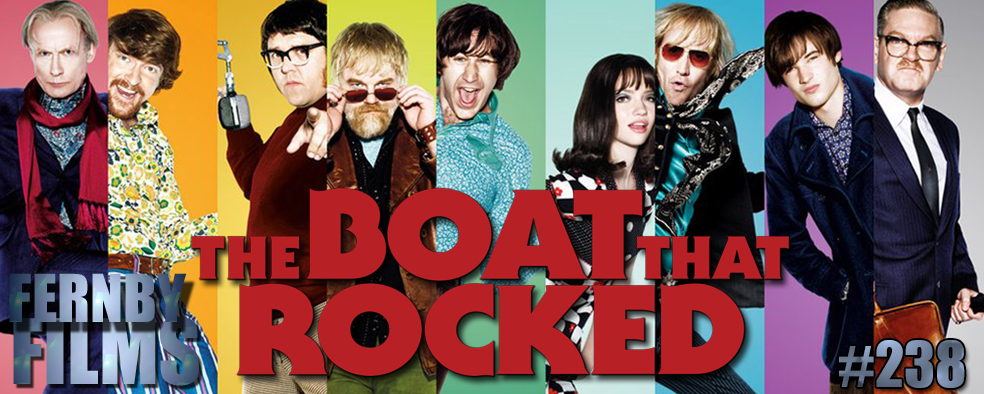
– Summary –
Director : Richard Curtis
Cast : Philip Seymour Hoffman, Rhys Ifans, Kenneth Brannagh, Nick Frost, Bill Nighy, William Adamsdale, Tom Sturridge, Tom Brooke, Rhys Darby, Katherine Parkinson, Chris O’Dowd, Tom Wisdon, Ralph Brown, Sinead Matthews, Jack Davenport, Emma Thompson, January Jones, Gemma Arterton.
Year of Release : 2009
Length : 130 Minutes
Synopsis:When a young man is sent to spend time on a boat broadcasting a pirate radio signal, he enters a world of sex, music and rock and roll.
Review : Long, mildly entertaining film that’s about as fulfilling as fondue. Good for a while, but never really satisfies.
********************
Rambling, stylish, largely fictitious throwback to an era long since gone, the age when rock ‘n’ roll was more about the music, and the radio DJ’s who played it, than the rock-stars themselves. Based loosely on historical fact, The Boat That Rocked is a great ensemble piece that sets out merely to entertain, and almost nothing else. Featuring some great stunt casting, and a genuine love of the era by director Richard Curtis (Notting Hill, Four Weddings & A Funeral), The Boat That Rocked is a genuinely entertaining film with little to say about life generally, unless your outlook is to party all of the time, all day, and all of the night.
In the mid sixties, so the film tells us, BBC radio in England only played around 40 minutes of opo music every week, which was clearly not enough to sate the voracious appetite of the listening public at the time: this was the era of The Beatles, Elvis, the Stones: all the classics. Of course, governmental bureaucracy had ensured that pop music was almost an underground cult by the time Radio Rock entered the scene. you see, rather than try (and fail) to obtain a radio license to broadcast rock ‘n’ roll, entrepreneurial people (like Bill Nighy’s Quentin) decided to build their own radio stations on ships anchored off the coast, and at the time the film begins, these broadcasts are in the process of being made illegal. But the public laps it up, the illicit feeling of popular culture being broadcast across the airwaves by a new generation of “shock” DJs, the modern equivalent of Howard Stern and his ilk, made superstars of the radio kings of that era.
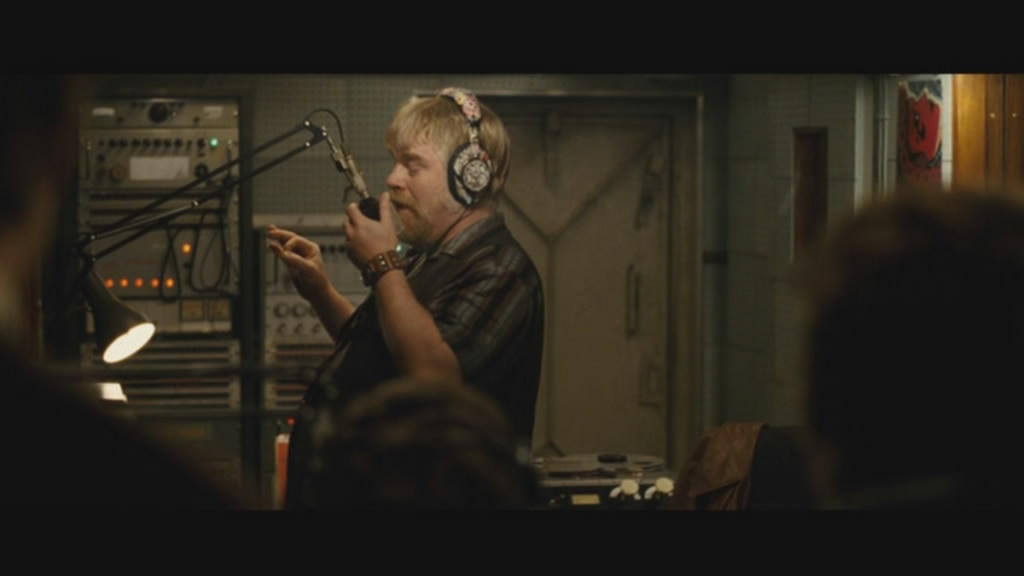
When Carl (Tom Sturridge) arrives on one particular ship, broadcasting Radio Rock (evidently the most popular of the fictitious pirate radio broadcasters on the ocean at the time!) he is inducted into a heady world of music, sex, debauchery and rock ‘n roll. Each of the radio DJ’s have their own unique personalities, their own “character”, which, truthfully, ain’t all that far removed from their real lives. The star of Radio Rock, The Count (Phillip Seymour Hoffman) gets a little antsy when legendary DJ Gavin (Rhys Ifans) decides to make a comeback (after a career change from the US radio system) and chooses Radio Rock as his first port of call. Carl is taken under the expansive wing of Dr Dave (Nick Frost), a crazy DJ who sleeps with anything and everything if given half a chance (and considering his weight issue, that’s an astounding effort). Also along for the ride are a variety of other DJ’s, including Midnight Mark, a sexual god for whom silence is his virtue…. amazing sexual chemistry mixed with the suave cool of The Fonz. Rhys Darby, the comedian from NZ who starred alongside Jim Carrey in Yes Man, makes an appearance as an emotionally hamfisted DJ Angus Knutsford (of course, allowing for jokes about being “knuts” along the way), as does the gorgeous Talulah Riley as Quentin’s niece, with whom Carl falls in love.
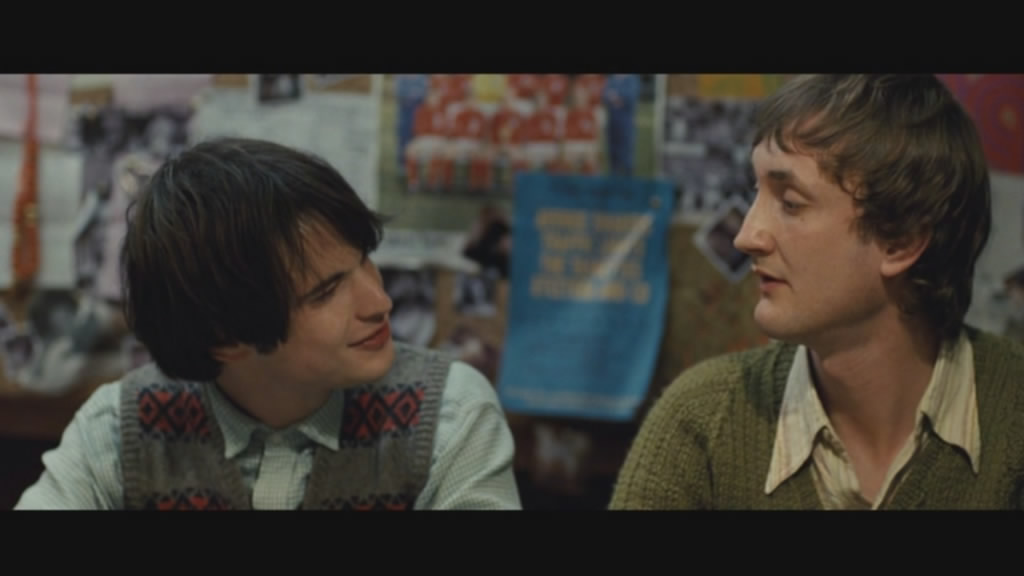
But by far the most amusing casting in The Boat That Rocked is resident government nasty Minister Dormandy, played by Kenneth Brannagh, and his “man in black” underling Twatt (yes, as in “twat”) played by Pirates of The Caribbean star Jack Davenport. These are the two men who threaten to shut down Radio Rock, and by extension all pirate radio stations. Brannagh is brilliant as the scheming, evil government minister, his bluster and strange turn of phrase eliciting some of the films biggest giggles. Lines involving the grasping of testicles and enjoying rope (perhaps he likes being tied up) are obscuring a slight homosexual tendency in him, although this is never outright stated in the film, it’s a subtle enough subtext to be present if you’re looking. And considering what the “twat” euphemism means it’s even more amusing to see a repressed gay man trying to gain the upper hand in this battle of the airwaves with a sidekick named after a part of the female anatomy.
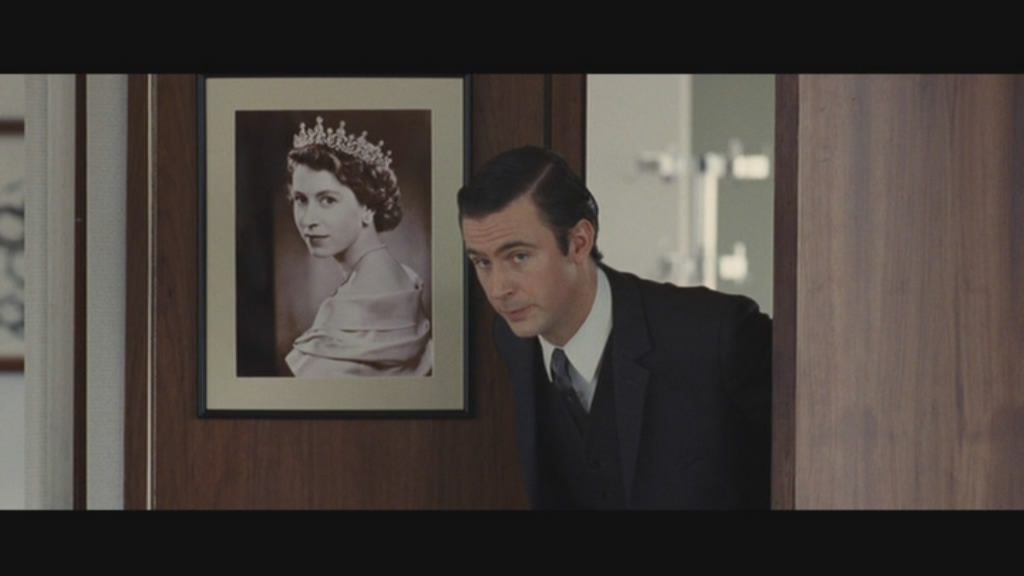
According to the internet, The Boat That Rocked originally clocked in at 3 hours, before director Curtis trimmed scenes out for length. To be honest, the film as it is is still a little too long, a ponderous 2+ hours of seafaring comedic slickness that often comes undone when it strays too far from it’s core characters. The ancillary characters get a fair chance to develop on screen, although perhaps the film would be improved had a definitive narrative been employed to keep the key cast on screen more often. Seymour Hoffman and Ifans, as well as Nick Frost and Sturridge himself, swing through the film accompanied by their lesser lights, a cornucopia of second-tier characters whose worth is only endowed by those around them; they’re cool because somebody on-screen says they are, not because we think they are. Richard Curtis has captured the feeling of the era, the carefree spirit of the sexual revolution, with consummate ease, although he seems less inclined to journey into the 60s a la Almost Famous than a skimming of the surface. Truthfully, this story could have been set in any period in history and it still would have been amusing; just not consequential. In fact, often, I found myself wondering exactly what the point of the film was. And that’s the problem. There isn’t really one.
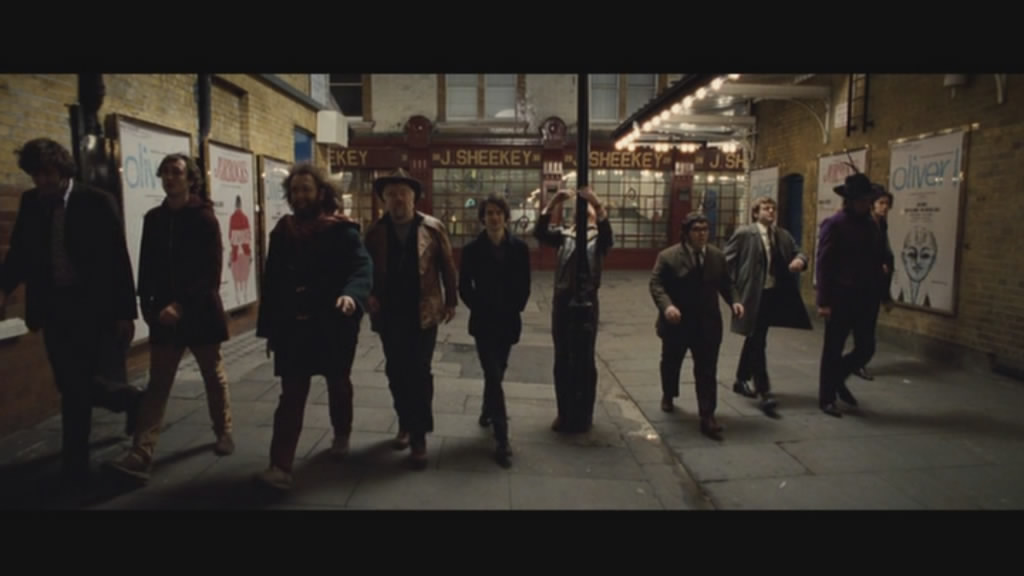
The script wanders all over the place at times, the narrative a jumble of half-missed ideas and genuine great ones: Midnight Mark is a standout piece of genius, although the revelation of exactly who Carl’s father is is left weakened and almost slipshod into the story as if Curtis just made it up as he went along. The film’s climax, in which Radio Rock is targeted by torpedoes, seems at odds with the hippie, psychedelic shenanigans of the preceding 120 minutes, although the final sequence itself reverts to type pretty quickly. It’s hard to know just what Curtis is trying to achieve with this film: mild entertainment, a risque burlesque, or perhaps an Austin Powers pastiche of style and comedy? A mix of both, and a barely coherent one at that. With a cast like this, you’d think the film might have turned out better, and truthfully, at times the movie does shine: only when the genuine stars of the film are on-screen. Even the soundtrack, which reads like a sixties pop chart “best of” manages to heighten the feeling of musical euphoria, although the mood wanes when things take a serious turn.
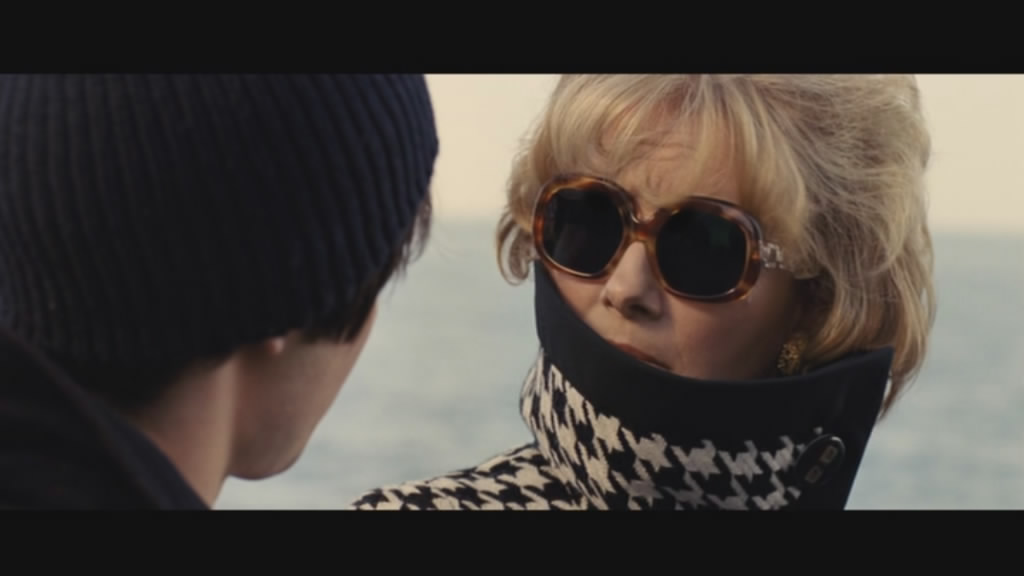
To be honest, I found a lot to like about The Boat That Rocked, but the problem with what I found is that is seemed to get a little lost in the obsequious cliche of Sixties pop, a dazzling retro colour scheme and soundtrack that muddles along for a while before eventually simply running out of steam. I enjoyed the film, but it’s hardly memorable. A decent trim of the plodding plot might have made this a whole lot more palatable, but two-plus hours of it, not all of it great, is a bit of a stretch for your attention span. The story isn’t strong enough to justify the length.
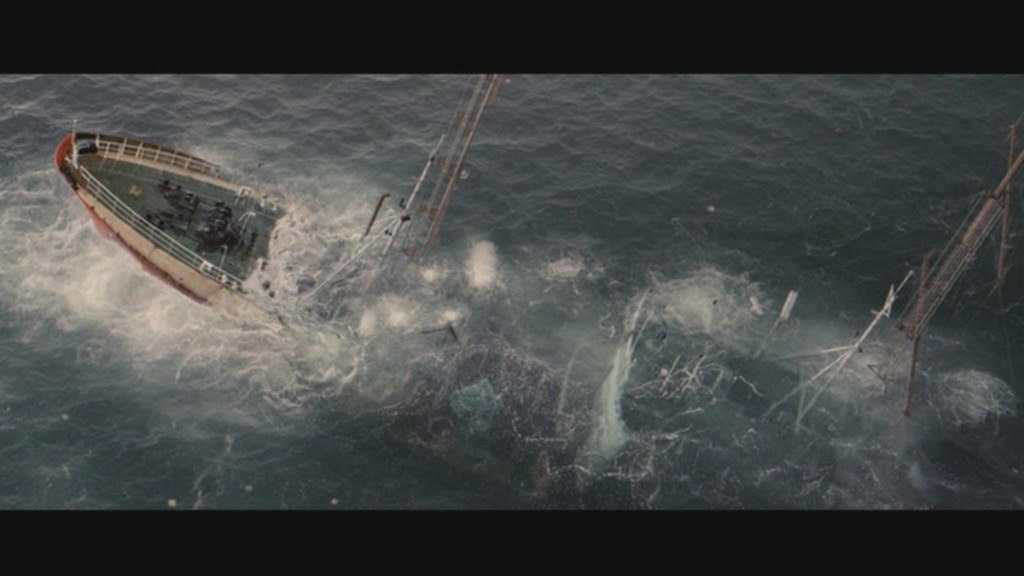
The Boat That Rocked is a pleasing, pleasant way to pass a couple of hours wallowing in the golden age of rock and roll, but for anybody looking for a more intelligent, character driven film with heart might find themselves wishing they’d grabbed the latest Adam Sandler flick from the shelf. It’s not bad, but it’s not great.






 The Boat That Rocked until you were sick into your own hands
The Boat That Rocked until you were sick into your own hands



